Have an account?


Chapter 6: Gaining Self-Awareness
11th - 12th grade, life skills.
22 questions

Introducing new Paper mode
No student devices needed. Know more
1. Leverrier predicted that an invisible planet was pulling the planet Uranus off its predicted course around the sun. Likewise, human beings are pulled off course by the invisible forces of their _____.
Conscious minds
Unconscious minds
Inner Guide
Many people sabotage their goals and dreams by unconsciously choosing actions, thoughts, and/or emotions that get them off course from their goals and dreams.
When Creators are off course, they tend to deny it make excuses, blame others, or give up.
One characteristic of Creators is that they are able to recognize and acknowledge when they are off course.
The story of Jerome, the accounting student, illustrates that once a person has a clear goal he will not get off course.
Eric Berne, the creator of a mode of counseling called Transactional Analysis, referred to our invisible inner forces as…
Defense mechanisms
As part of our script, each of us has developed three kinds of habit patterns: behaviors, thoughts, and emotions.
1. Our habit patterns are motivated by our unconscious core _____.
We seem to create our scripts as a result of…
How others responded to us
What significant adults said to us
Observing the behavior of significant adults in our lives
All of the above
Diana, the student in the author’s writing course, had a script from her childhood that said her brain didn’t work well. (Rewriting Your Outdated Script)
When our core beliefs about ourselves, about other people, or about the work are inaccurate, they can sabotage our success. (Rewriting Your Outdated Scripts)
Diana’s core beliefs about her inability to think caused her to hear what she expected to hear rather than what her teacher actually said. (Rewriting Your Outdated Scripts)
The parts of our scripts that are available to our conscious minds are our patterns of self-defeating actions, thoughts, and emotions. By revising these three patterns we can help revise our limiting core_____.
On Course at Work: Self-Awareness at Work
Hard skills are the special-knowledge skills that you’ve learned to do throughout your life; for example, swimming, writing, solving math problems, building a house, creating a budget, backpacking, playing chess, and reading.
Soft skills are the ones you have developed to cope with life; for example, making choices as a Creator, motivating yourself, being industrious, in developing relationships, and believing in yourself.
If you have not yet declared a major, where can you go on campus to take one of the inventories recommended in On Course?
Your advisor’s office
The Registrar’s office
The Student Union
The Career Center
Becoming aware of the match between _____ improves your chances of finding a satisfying career match.
Your desired income level and your preferred location
Your interests and your personality
Your family’s plans and your need to work near them
Your personality and your desired income level
(Believing in Yourself: Write Your Own Rules)
According to psychologist Virginia Stir, we are all living by rules, though we may not be aware of them
All of the unconscious rules that we live by need to be revised.
( Believing in Yourself: Write Your Own Rules)
The author of On Course has polled thousands of college instructors who identify three behaviors that their most successful students do consistently. Which of the following is NOT one of these top three behaviors of successful students (though it may be a good rule nonetheless)?
Attend every class from beginning to end
Seek help from tutors
Do their best work on all assignments
Participate actively in class
At Baltimore City Community college, a study found that, on average, the more classes that students missed, the higher their grades were, especially in introductory course.
A personal rule is your conscious intention. You may need to break one of your rules if something of a higher _____conflicts with it.
Explore all questions with a free account

Continue with email
Continue with phone
17 Self-Awareness Activities and Exercises (+Test)

In terms of psychology, self-awareness is often defined as the ability to engage in some kind of reflective awareness.
As you develop an awareness of the self, you begin to connect with your own unique identity. As you focus on yourself and start evaluating your current behavior, in comparison to your internal standards and values, you become self-conscious, and you become an objective evaluator of yourself.
There are many exercises and activities you can do to develop this self-awareness, from questions you can ask yourself to simple exercises.
In this article, we will take a look at some of those self-awareness tools.
Before you continue, we thought you might like to download our three Self-Compassion Exercises for free . These detailed, science-based exercises will not only help you increase the compassion and kindness you show yourself but will also give you the tools to help your clients, students, or employees show more compassion to themselves.
This Article Contains:
What are self-awareness activities and exercises, common self-awareness techniques, 23 self-awareness questions to ask, 2 self-awareness activities for adults, 2 self-awareness training activities for youth and students, 3 self-awareness activities and exercises for kids and toddlers, 4 employee activities for the workplace, 2 self-awareness worksheets (incl. pdf), can we measure and test self-awareness, 2 useful tests, a take-home message.
Self-awareness activities and exercises are tools that can help you to not only reach your goals but also to discover who you are at core level and what you want out of life.
The more you ‘peel the onion’ per se, the more you will discover what lies underneath. Self-awareness and self-improvement go hand in hand.
Becoming more self-aware can help you understand your wants, needs, and desires as well as your strengths and weaknesses.
Self-awareness is also an important tool for success. Those internal mental processes guide how you behave and how you act. When you become more self-aware, you begin uncovering those destructive thought patterns and unhealthy habits.

- Mindfulness Meditation.
- Grounding techniques, and reconnecting to the Earth.
- Tai Chi, Qigong, or Yoga.
- Strength Assessments , such as the Values in Action Strength Test, from the University of Pennsylvania.
- Journaling.
- Having a Personal Vision.
- Observing others.

Download 3 Free Self-Compassion Exercises (PDF)
These detailed, science-based exercises will equip you to help others create a kinder and more nurturing relationship with themselves.

Download 3 Free Self-Compassion Tools Pack (PDF)
By filling out your name and email address below.
While there are probably hundreds of questions you could ask yourself, in terms of self-awareness, there are a few that stand out.
Self-awareness questions on values and life goals
- What does your ideal “you” look like?
- What kinds of dreams and goals do you have?
- Why are these dreams or goals important?
- What is keeping you from these dreams or goals?
- Rank 5-10 of the most important things in your life in your career, family, relationships and love, money, etc.
- Now think about the proportion of time you dedicate to each of these things.
- What would you recommend to your children to do or not to do?
Self-awareness questions on personality
- Describe yourself in three words.
- Ask yourself if your personality has changed since childhood.
- Is your personality like either of your parents?
- What qualities do you most admire in yourself?
- What is your biggest weakness?
- What is your biggest strength?
- What things scare you?
- Do you make decisions logically or intuitively?
- How would you complete the question: “What if?”.
Self-awareness questions on relationships
- Describe your ideal intimate relationship.
- How satisfied are you in your current relationship?
- Who would you call if you only had a few minutes to live? What would you say?
- Who have you loved the most?
- Of all the relationships you have had, describe the best moment.
- Describe a devastating moment in terms of relationships.
- Ask yourself if you treat yourself better than others?
These questions are designed to make you think. Answering these questions is a powerful method of self-discovery.

1. Mindfulness Meditation
Derived from Mindfulness-Based Stress Reduction, created by Jon Kabat-Zinn, mindfulness is an awareness that arises through paying attention to the present moment, in a non-judgmental manner.
In mindfulness meditation, you learn to focus on the present moment in the same way.
Harvard researchers studied mindfulness and found that it seemed to change the brain in depressed patients. Studies have also shown some fantastic benefits of mind-body practices, such as lower blood pressure in hypersensitive patients after relaxation-response training.
Learning how to do mindfulness meditation is relatively simple.
Here is an excellent technique to get started:
- Find a place where you won’t be disturbed. You may sit in a chair or on the floor. Be sure to keep your back and neck straight.
- As you begin, try and stay focused on the present moment. Don’t think about the past or the future.
- Develop an awareness of the breath, and focus on the feeling of air moving in and out of your body as you breathe in and out. Notice your belly rising and falling, as the air enters your nostrils and leaves your mouth. Notice how each breath is a little different.
- Notice every thought that comes and goes. You can even name your thoughts. If you are worried, acknowledge that and let it go. Don’t ignore your thoughts, but make a note of them, using your breath as an anchor.
- If you have trouble staying focused on the present moment, bring your focus back to your breathing and don’t be too hard on yourself.
- Strive for a minute or so initially and work your way up to longer periods.
2. Grounding Techniques
According to Dr. Sara Allen, a psychotherapist, grounding is a wonderful way to calm down quickly, and it’s also an excellent tool for developing self-awareness.
Grounding is another term for connecting with the Earth and bringing your focus into the present moment, similar to mindfulness.
One simple grounding technique is called the Grounding Chair. (Allen, 2019)
- Find a comfortable chair to sit in and close your eyes. Make sure your feet can touch the floor.
- Start breathing in and exhaling to the count of 3.
- Bring your focus to your body next. Notice how your body feels and how your legs and feet feel. Notice how your back feels against the chair or surface. Notice the texture of the fabric and how the seat feels.
- Next, imagine your feet are pushing down into the ground. Picture your energy draining down from your mind, and out through your feet into the Earth.
- As the energy drains from your head, notice how heavy each part of your body feels as you relax those muscles.
- Feel this sense of heaviness going down your legs, through your feet and down into the ground.
You can do this same technique outside, with your shoes off. Something is compelling about connecting with the Earth in this manner.
There are many enjoyable self-awareness activities for youths and students as well.
One of these is the Sparks: Peer-to-Peer Interview worksheet. The basis of this exercise is the exploration of a child’s passions, interests, and talents, otherwise known as sparks.
The worksheet has six simple questions that can help someone delve into these ideas.
- What is one of your sparks (passions, interests, talents)?
- How did you discover that this is one of your sparks?
- How do you feel when you are doing your spark?
- Think of somebody who is really into their spark/passion. Describe what you see.
- Do you have a spark champion (an adult who helps you explore and develop your self-awareness skills )? If yes, describe how this person helps you.
- Do you set goals and make plans to get better at your spark/talent? If yes, give me an example.
This worksheet is also available on the actforyouth.net website . This kind of simple questioning can help someone identify and build upon his or her strengths.
Another great resource is the self-awareness worksheet for kids, available on the understood.org website for learning and attention issues.
The self-awareness worksheet has seven questions that can help a child to self-advocate. This worksheet can also be done with the child, to help them build an awareness of their strengths and weaknesses.

While a child this age may not be entirely self-aware, they do know how to create a mental picture in their mind.
As their self-awareness develops, so does their self-identity. For children of this age, self-awareness is more about noticing the differences and discovering their bodies and emotions.
Engaging in activities that help support this can go a long way to helping them learn and grow.
1. Same Versus Different Activity
Children of this young age do recognize the similarities and differences, which includes things like skin color and other physical characteristics that set them apart from others.
A fun way to do this is to have kids try on different color socks or knee-high nylons, representing different skin colors. As they do this, you can emphasize the beauty and uniqueness of all the different colored skin.
According to childhood specialist Barbara Biles, this kind of simple activity can help a child learn to appreciate their skin color and the skin color of others.
2. Physical Awareness Activity
Physical self-awareness also expands with age. Growth activities are a great way to help promote this. Growth activities help a young child better understand and accept their developing body.
These kinds of encouraging, positive, interactive growth activities can be very helpful. Things like hanging a height and growth chart on the wall or having a child point to various body parts by looking in the mirror, are fun activities. Children can also draw an outline of their body or their hands and feet.
This kind of activity can help promote physical awareness and self-acceptance for a young child.
3. Self-Responsibility Activity
Teaching responsibility can also be considered a self-awareness activity. Young children frequently leave toys around the house without realizing any sense of responsibility.
Making a young child responsible for his toys or possessions in a fun and interactive way can go a long way to teaching them the necessary skills.
According to child educator Jean Warren, this kind of activity can also help a young child attain self-worth and group identity.
These activities and more are available on the healthfully.com website .
Daniel Goleman, a psychologist specializing in self-awareness and emotional intelligence, suggests that people with a solid sense of self-awareness generally have more self-confidence , and they have a more realistic assessment of themselves.
Some activities that can help improve self-awareness include practicing how you feel throughout the day, considering how your negative emotions impact others, thinking about ways you can better manage your emotions as well as taking an honest look at your strengths and weaknesses.
According to Goleman, it’s essential to recognize that emotions can be fleeting, and they shouldn’t be the foundation of decision-making or communication.
As you consider how your negative emotions impact others, like your boss or your co-workers, you also begin to realize how emotions like anger, jealousy, or frustration have a negative impact. Building self-awareness can help you acknowledge the fallout and the repercussions of such behavior.
Learning to manage your emotions better can also make a big difference. Doing so can help you avoid knee-jerk reactions or saying things you don’t mean.
All of this requires taking an honest look at your strengths and weaknesses. You can do this by looking at past performance reviews or asking for feedback from someone you trust like your peers or from your boss. When you do this, you can actively work on improving those weak areas.

The questionnaire contains 35 questions which lead a person into self-discovery and can be seen as a fun way to become more self-aware.
As a sample, questions include:
- What is the trait you most deplore in yourself?
- What do you regard as the lowest depth of misery?
- Who are your heroes in real life?
- What is your greatest regret?
These questions can help build self-awareness and strengthen defense systems against harmful thoughts, feelings, and behaviors.
The Setting Valued Goals worksheet is another useful tool to help someone identify what they want out of life, based on personal values.
Using this type of tool can also help motivate someone who may be struggling in life. Identifying goals can help someone be more self-aware as they start to get an idea of what it will take to achieve this goal.
The reader is prompted to reflect on personal values, with questions such as:
- What do you consider most important in life?
- What makes you feel energized?
- What makes you happiest, most satisfied, and most fulfilled?
Rouge test (self-recognition test) – Geert Stienissen
Dispositional self-awareness can be conceptualized in different ways, including insight, reflection, rumination, and mindfulness. (Sutton, 2016)
According to the research, self-awareness is typically associated with positive psychological wellbeing with varying outcomes.
Self-awareness is generally defined as the extent to which someone is consciously aware of their internal state as well as their relationships or interactions with others. (Sutton, 2016).
This idea can be further broken down into situational self-awareness and dispositional self-awareness.
Situational self-awareness is an automatic process that helps you know where you are and what you can do. It enables you to compare your current actions to your internal standards helping you foresee if you need to make any adjustments. (Silva & Duval, 2001).
Dispositional self-awareness, on the other hand, is the tendency for one to focus on and reflect on their own psychological processes as well as their subjective experiences and relationships with others. (Fenigstein et al., 1975)
Fenigstein also breaks this concept down further, by differentiating between public and private self-consciousness. Public self-consciousness is about how we appear to others where private self-consciousness is more about developing an awareness of our internal state.
One tool for measuring private self-consciousness is The Self-Reflection and Insight Scale or SRIS, (Grant, Franklin, & Langford, 2002)
This scale was developed as a measure of private self-consciousness, which assesses one’s internal state of awareness or insight separately from self-reflection.
Self-reflection refers to the extent to which one evaluates and pays attention to their internal state where insight is more about clarity of understanding.
By developing measures of self-awareness, we can continue expanding our awareness in these areas.

The test measures your DISC personality type:
This can help you better predict your behavior towards others as well as those things you do every day.
The test contains 28 groups of four statements. The questions are to be answered honestly and spontaneously. The test only takes about 5 to 10 minutes to complete.
Some of the questions include:
- People look up to me.
- I tend to be a kind person.
- I accept life as it comes.
- People say I have a strong personality.
The idea is to study all of the descriptions in each group of four, and select the one that most describes you.
You may also examine the three remaining choices, and decide which description you consider the least like you.
The full version of the test can be accessed via the 123test.com website .
The Jung Personality test can help you explore things like how you think, how you make decisions, and how you deal with others.
The test also helps you explore whether you are an introvert or an extrovert. The test is similar to the Myers-Briggs type model, initially developed by Katherine Cook Briggs and her daughter Isabel Briggs Myers.
The Jung personality test can help answer the following questions:
- What is your personality type?
- What are your Jung types?
- How does your type fit certain kinds of jobs?
The Jung test was developed by the work of Carl Gustav Jung, who was a Swiss psychiatrist and the originator of Jungian Psychology, which breaks the personality up into four archetypes:
- The Persona
- The Anima/Animus
The Jung personality test has 60 choices. Participants choose the statement that best describes them.
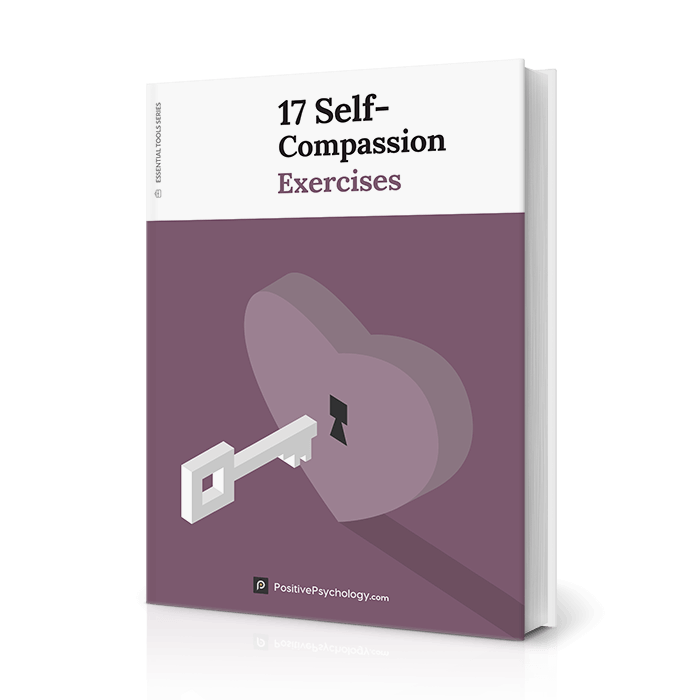
17 Exercises To Foster Self-Acceptance and Compassion
Help your clients develop a kinder, more accepting relationship with themselves using these 17 Self-Compassion Exercises [PDF] that promote self-care and self-compassion.
Created by Experts. 100% Science-based.
Being self-aware is vital for both personal and professional success. When you are self-aware, you can choose where to focus your emotions, your energy, and your personality so that you can better direct the course of your life.
Self-awareness helps you be much more aware of your thoughts and emotions and how these things guide your life.
The best way to continually develop self-awareness is to learn to look at yourself objectively and to try and see yourself as others see or perceive you. The more self-aware you are, the more you can improve and make changes in your life.
If you enjoyed this topic, for further reading we share a short selection of the 10 Best Self-Awareness books and explore the benefits of self-awareness according to science.
We hope you enjoyed reading this article. Don’t forget to download our three Self Compassion Exercises for free .
- 23 Thought-provoking Questions To Boost Your Self-awareness. (2019, February 17). Retrieved from https://ourmindfullife.com/23-self-awareness-questions/
- Allen, S. (2019, February 13). 7 Simple Grounding Techniques For Calming Down Quickly . Retrieved from https://drsarahallen.com/7-ways-to-calm/
- Bhasin, M. K., Denninger, J. W., Huffman, J. C., Joseph, M. G., Niles, H., Chad-Friedman, E., … Libermann, T. A. (2018, May). Specific Transcriptome Changes Associated with Blood Pressure Reduction in Hypertensive Patients After Relaxation Response Training . Retrieved from https://www.ncbi.nlm.nih.gov/pubmed/29616846
- Davenport, B. (2019, March 12) Emotional Intelligence In The Workplace . Retrieved from https://liveboldandbloom.com/02/self-awareness-2/emotional-intelligence-workplace
- Fenigstein A., Scheier M. F., Buss A. H. (1975). Public and private self-consciousness: Assessment and theory. Journal of Counselling and Clinical Psychology , 43(4), 522–527.
- Grant A. M., Franklin J., Langford P. (2002). The Self-Reflection and Insight Scale: A new measure of private self-consciousness. Social Behavior and Personality , 30(8), 821–835.
- Jeffrey, S. (2019, April 20). 15 Self Awareness Activities and Exercises to Build Emotional Intelligence . Retrieved from https://scottjeffrey.com/self-awareness-activities-exercises/
- Johnston, J. (2019, January 10). Activities for Preschool-Age Children About Self Awareness . Retrieved from https://healthfully.com/512350-activities-for-preschool-age-children-about-self-awareness.html
- Nguyen. (2016, January 11). 12 Self-Awareness Exercises That Fuel Success . Retrieved from https://www.entrepreneur.com/article/254669
- Powell, A. (2018, August 27). Harvard researchers study how mindfulness may change the brain in depressed patients . Retrieved from https://news.harvard.edu/gazette/story/2018/04/harvard-researchers-study-how-mindfulness-may-change-the-brain-in-depressed-patients/
- Ron Tamir Nehr. (2019, July 17). Self Awareness: 10 Great Techniques . Retrieved from https://rontamirnehr.com/self-awareness-techniques/
- Sutton, A. (2016, November 18). Measuring the Effects of Self-Awareness: Construction of the Self-Awareness Outcomes Questionnaire . Retrieved from https://www.ncbi.nlm.nih.gov/pmc/articles/PMC5114878/
- Wong, C. (2019, September 3). Mindfulness Meditation – How Do I Do It? Retrieved from https://www.verywellmind.com/mindfulness-meditation-88369
Share this article:
Article feedback
What our readers think.
I really like this content.
thorough and clear resume of how developed brain/person can be well managed , without meaning you squash the individual .
Let us know your thoughts Cancel reply
Your email address will not be published.
Save my name, email, and website in this browser for the next time I comment.
Related articles

Reparenting: Seeking Healing for Your Inner Child
In our work as therapists, we often encounter the undeniable truth: we never truly outgrow our inner child. A youthful part within us persists, sometimes [...]

30 Best Self-Exploration Questions, Journal Prompts, & Tools
Life is constantly in flux – our environment and ‘self’ change continually. Self-exploration helps us make sense of who we are, where we are, and [...]
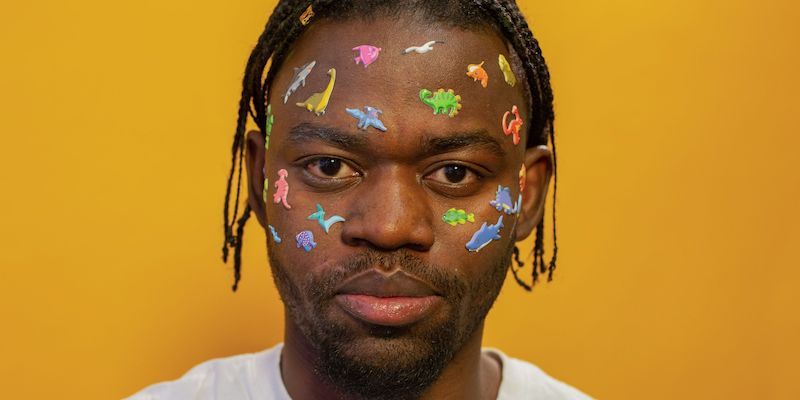
Inner Child Healing: 35 Practical Tools for Growing Beyond Your Past
Many clients enter therapy because they have relationship patterns that they are tired of repeating (Jackman, 2020). They may arrive at the first session asking, [...]
Read other articles by their category
- Body & Brain (49)
- Coaching & Application (58)
- Compassion (25)
- Counseling (51)
- Emotional Intelligence (23)
- Gratitude (18)
- Grief & Bereavement (21)
- Happiness & SWB (40)
- Meaning & Values (26)
- Meditation (20)
- Mindfulness (44)
- Motivation & Goals (45)
- Optimism & Mindset (34)
- Positive CBT (30)
- Positive Communication (20)
- Positive Education (47)
- Positive Emotions (32)
- Positive Leadership (19)
- Positive Parenting (15)
- Positive Psychology (34)
- Positive Workplace (37)
- Productivity (17)
- Relationships (43)
- Resilience & Coping (38)
- Self Awareness (21)
- Self Esteem (38)
- Strengths & Virtues (32)
- Stress & Burnout Prevention (34)
- Theory & Books (46)
- Therapy Exercises (37)
- Types of Therapy (64)
- Bipolar Disorder
- Therapy Center
- When To See a Therapist
- Types of Therapy
- Best Online Therapy
- Best Couples Therapy
- Best Family Therapy
- Managing Stress
- Sleep and Dreaming
- Understanding Emotions
- Self-Improvement
- Healthy Relationships
- Student Resources
- Personality Types
- Guided Meditations
- Verywell Mind Insights
- 2024 Verywell Mind 25
- Mental Health in the Classroom
- Editorial Process
- Meet Our Review Board
- Crisis Support
How to Boost Your Self-Awareness
Here's why knowing yourself is so important—plus, how to improve it
Kendra Cherry, MS, is a psychosocial rehabilitation specialist, psychology educator, and author of the "Everything Psychology Book."
:max_bytes(150000):strip_icc():format(webp)/IMG_9791-89504ab694d54b66bbd72cb84ffb860e.jpg)
Rachel Goldman, PhD FTOS, is a licensed psychologist, clinical assistant professor, speaker, wellness expert specializing in eating behaviors, stress management, and health behavior change.
:max_bytes(150000):strip_icc():format(webp)/Rachel-Goldman-1000-a42451caacb6423abecbe6b74e628042.jpg)
- Development
- How to Improve
- Self-Consciousness
Frequently Asked Questions
Self-awareness is your ability to perceive and understand the things that make you who you are as an individual, including your personality, actions, values, beliefs, emotions, and thoughts. Essentially, it is a psychological state in which the self becomes the focus of attention .
While self-awareness is central to your identity, it is not something you are acutely focused on at every moment of every day. Instead, self-awareness becomes woven into the fabric of who you are and emerges at different points depending on the situation and your personality .
At a Glance
While we might not think about it all the time, self-awareness is critical to our understand of our selves and our relationship with the world. This understanding starts to form early in life, and become increasingly important as we grow older and begin to gain greater insights into our own thoughts, feelings, sensations, and behavior patterns. Keep reading to learn more about what experts have learned about how self-awareness develops, the different forms it can take, and what you can do to gain deeper insights into who you are as an individual.
How Does Self-Awareness Develop?
Self-awareness is one of the first components of the self-concept to emerge. People are not born completely self-aware. Yet evidence suggests that infants do have a rudimentary sense of self-awareness.
Infants are aware that they are separate from others, as evidenced by behaviors such as the rooting reflex, in which an infant searches for a nipple when something brushes against their face. Researchers have also found that even newborns can differentiate between self- and non-self touch.
Studies have demonstrated that a more complex sense of self-awareness emerges around one year of age and becomes much more developed by approximately 18 months of age.
Self-Awareness and the Mirror Recognition Task
One way that research can measure self-awareness is by using what is known as a mirror self-recognition task. In a classic conducted by researchers Lewis and Brooks-Gunn, the researchers utilized this task to examine how self-awareness develops.
The researchers applied a red dot to an infant's nose and held the child to a mirror. Children who recognized themselves in the mirror would reach for their own noses rather than the reflection in the mirror, which indicated that they had at least some level of self-awareness.
Lewis and Brooks-Gunn found that almost no children under one year would reach for their own noses rather than the reflection in the mirror.
About 25% of the infants between 15 and 18 months reached for their own noses while about 70% of those between 21 and 24 months did so. This suggests that children exhibit self-awareness and self-recognition at 15 months and have a fully developed sense of mirror recognition by 24 months.
It is important to note that the Lewis and Brooks-Gunn study only indicates an infant's visual self-awareness; children might actually possess other forms of self-awareness even at this early point in life. For example, researchers have also suggested that expressing emotions involves self-awareness and an ability to think about oneself in relation to other people.
Self-Awareness and the Brain
Researchers have proposed that an area of the brain known as the anterior cingulate cortex located in the frontal lobe region plays an important role in developing self-awareness. Studies have also used brain imaging to show that this region becomes activated in adults who are self-aware.
The Lewis and Brooks-Gunn experiment suggests that self-awareness begins to emerge in children around the age of 18 months, an age that coincides with the rapid growth of spindle cells in the anterior cingulate cortex.
However, one study found that a patient retained self-awareness even with extensive damage to areas of the brain including the insula and the anterior cingulate cortex.
This suggests that these areas of the brain are not required for most aspects of self-awareness and that awareness may instead arise from interactions distributed among brain networks.
Levels of Self-Awareness
So how exactly do children become aware of themselves as separate beings? One major theory of self-awareness, introduced by developmental psychologist Philippe Rochat, suggests that there are five levels of self-awareness. Children progress through these stages between birth and approximately age 4 or 5:
- Differentiation : A baby begins to acknowledge their own reflection. They may detect there is something different or special about looking at their reflection.
- Situation : A baby begins to recognize their own reflection, being, and movements as separate from those around them.
- Identification : This is the stage during which a child fully knows that it is their own reflection in a mirror. They know, "This is me ."
- Permanence : They have a complete sense of themselves and can identify themselves in pictures or videos, even as their appearance changes.
- Self-consciousness : A child adapts a third-person point of view of themselves; they become aware of the idea that others perceive them in certain ways. This may result in feelings such as pride or shame .
Types of Self-Awareness
Self-awareness also takes different forms that can emerge in different situations and settings. Psychologists often break self-awareness down into two different types, either public or private.
Public Self-Awareness
This type emerges when people are aware of how they appear to others. Public self-awareness typically emerges in situations when people are at the center of attention .
This type of self-awareness often compels people to adhere to social norms . When we are aware that we are being watched and evaluated, we often try to behave in socially acceptable and desirable ways.
Public self-awareness can also lead to evaluation anxiety in which people become distressed, anxious, or worried about how they are perceived by others. Performance anxiety and social anxiety are two examples of how public self-awareness can sometimes lead to worry and distress about how other evaluate us.
Public Self-Awareness Examples
You may experience public self-awareness in the workplace, such as when you're giving an important presentation or when telling a story to a group of friends. Because you are the focus of attention, you become more acutely aware of how others might perceive you.
Private Self-Awareness
This type happens when people become aware of some aspects of themselves, but only in a private way. For example, seeing your face in the mirror is a type of private self-awareness.
Certain strategies can help you build a greater sense of private self-awareness. For example, journaling, meditating, and practicing mindfulness can help you become more aware of your inner thoughts, feelings, and sensations.
Private Self-Awareness Examples
Feeling your stomach lurch when you realize you forgot to study for an important test or feeling your heart flutter when you see someone you are attracted to are also examples of private self-awareness.
Why Is Self-Awareness Important?
Self-awareness is important because it allows you to reflect on aspects of yourself. As you understand your abilities and tendencies, your self-awareness also allows you to think about how you interact with others and the world around you.
Self-aware people are able to manage their behaviors and adapt to situations. They can accurately evaluate what the situation requires and then modify their actions accordingly.
This can be vital in many areas of life, including your relationships and work. It can also factor in when it comes to personal development. As you become more aware of your strengths and weaknesses, you can take steps to capitalize on the things you are good at and explore ways to improve the areas where you might struggle.
How to Improve Your Self-Awareness
So how do you grow self-awareness? There are many ways you can practice being present with yourself and your emotions, which, in turn, can help improve your self-awareness.
Meditation can be an especially useful practice because you don't have to worry about changing anything—simply noticing what happens during a meditation can bring greater awareness of your thoughts and feelings.
Maybe you notice that you hold tension in your body by clenching your jaw, for instance, or that you tend to worry so much about the future that it's hard to be in the present moment. This is all valuable information that can help you get to know yourself and your tendencies.
Journaling is a practice of self-reflection that can help you notice how you think and behave and even which areas in your life you may wish to improve. It can be a therapeutic way to gain insight into your life events and relationships.
Talk Therapy
During therapy—such as cognitive behavioral therapy (CBT)—a therapist works with you to address negative thought patterns or behaviors.
By understanding the underlying cause of your negative thoughts, for instance, you're in a more advantageous position to change them and use healthy coping mechanisms instead.
Develop Your Emotional Intelligence
Self-awareness and emotional intelligence (EQ) go hand in hand. EQ refers to a person's ability to perceive their own emotions and those of others. Someone with a high EQ can effectively respond to emotions with empathy and compassion .
Of course, no one is perfect, and EQ is a skill like any other. But by learning to express your emotions in a healthy way and practicing active listening in your relationships, you're contributing to the expansion of your self-awareness as well.
Try Our EQ Test
Our fast and free EQ test can help you determine whether or not your responses to certain situations in life indicate a high level of emotional intelligence:
When Self-Awareness Leads to Self-Consciousness
Sometimes, people can become overly self-aware and veer into what is known as self-consciousness . Have you ever felt like everyone was watching you, judging your actions, and waiting to see what you will do next? This heightened state of self-awareness can leave you feeling awkward and nervous in some instances.
In many cases, these feelings of self-consciousness are only temporary and arise when we are "in the spotlight." For some people, however, excessive self-consciousness can reflect a chronic condition such as social anxiety disorder .
While self-awareness plays a critical role in how we understand ourselves and how we relate to others and the world, excessive self-consciousness can result in challenges such as anxiety and stress .
If you struggle with self-consciousness, discuss your symptoms with a doctor or mental health professional to learn more about what you can do to cope with these feelings.
Being self-aware is all about having an understanding of your own thoughts, feelings, values, beliefs, and actions. It means that you understand who you are, what you want, how you feel, and why you do the things that you do.
There are many different ways to think about self-awareness, but four keys that are often mentioned included mindfulness, self-compassion, reflection, and feedback.
Mindfulness allows people to become more aware of themselves in the present, while compassion allows them to do so without passing judgment on themselves. Reflection and feedback allow people to take what they have learned and improve themselves in order to achieve their goals and reach their full potential.
The five elements of self-awarenesses are:
- Consciousness : This means being aware of your internal experiences, including your emotions and thoughts.
- Self-knowledge : This element is focused on your understanding of who you are, including your beliefs, values, and motivations.
- Emotional intelligence : This element is focused on the ability to understand and manage emotions.
- Self-acceptance : This aspect is centered on accepting who you are and showing yourself compassion and kindness.
- Self-reflection : This element of self-awareness involves being able to think deeply about your feelings, thoughts, and goals in order to gain an even better understanding of who you are and your place in the world.
Rochat, P. Five levels of self-awareness as they unfold early in life . Consciousness and Cognition . 2003;12(4):717-31. doi:10.1016/S1053-8100(03)00081-3
Lewis M, Minar NJ. Self-recognition and emotional knowledge . Eur J Dev Psychol . 2022;19(3):319-342. doi:10.1080/17405629.2021.1890578
Moeller SJ, Goldstein RZ. Impaired self-awareness in human addiction: deficient attribution of personal relevance . Trends Cogn Sci (Regul Ed). 2014;18(12):635-41. PMID: 25278368
Philippi CL, Feinstein JS, Khalsa SS, et al. Preserved self-awareness following extensive bilateral brain damage to the insula, anterior cingulate, and medial prefrontal cortices . PLoS ONE. 2012;7(8):e38413. doi:10.1371/journal.pone.0038413
Rochat P. Layers of awareness in development . Developmental Review . 2015;38:122-145. doi:10.1016/j.dr.2015.07.009
Sutton A. Measuring the effects of self-awareness: Construction of the self-awareness outcomes questionnaire . Eur J Psychol . 2016;12(4):645-658. doi:10.5964/ejop.v12i4.1178
Xiao Q, Yue C, He W, Yu JY. The mindful self: A mindfulness-enlightened self-view . Front Psychol . 2017;8:1752. doi:10.3389/fpsyg.2017.01752
Pena‐Silva RA, Velasco‐Castro JM, Matsingos C, Jaramillo‐Rincon SX. Journaling as an effective tool to promote metacognition and enhance study methods in a pharmacology course, during and after the pandemic . FASEB J . 2022;36(Suppl 1):10.1096/fasebj.2022.36.S1.R4840. doi:10.1096/fasebj.2022.36.S1.R4840
Nakao M, Shirotsuki K, Sugaya N. Cognitive–behavioral therapy for management of mental health and stress-related disorders: Recent advances in techniques and technologies . BioPsychoSocial Med. 2021;15(1). doi:10.1186/s13030-021-00219-w
Serrat O. Understanding and developing emotional intelligence . Knowledge Solutions. 2017:329-339. doi:10.1007/978-981-10-0983-9_37
Dasilveira A, Desouza ML, Gomes WB. Self-consciousness concept and assessment in self-report measures . Front Psychol . 2015;6:930. doi:10.3389/fpsyg.2015.00930
Stein DJ. Social anxiety disorder and the psychobiology of self-consciousness . Front Hum Neurosci . 2015;9:489. doi:10.3389/fnhum.2015.00489
By Kendra Cherry, MSEd Kendra Cherry, MS, is a psychosocial rehabilitation specialist, psychology educator, and author of the "Everything Psychology Book."
- Show all results for " "

The Power of Self-Awareness
Study Flashcards
5 Questions
Which of the following is not a reason why knowledge about self is important.
Helps to reach your goals
What is self-concept?
An individual's perception of self
Which of the following factors can affect self-concept?
All of the above
What dimensions does self-concept change over time?
Physical, emotional, intellectual, and functional
How does self-concept influence health status?
It affects the ability to function
Unlock your full potential by understanding the components of self and gaining self knowledge. Take this quiz to learn how self-awareness can help you control emotions, reach your goals, make better decisions, and improve relationships. Discover the power of self-discovery and personal growth.
Make Your Own Quizzes and Flashcards
Convert your notes into interactive study material.
More Quizzes Like This

Self-Concept in Psychiatric Nursing
Psych Preliminary Mental Health Concepts Quiz
Nursing Quiz: Ineffective Coping and Chronic Health Alteration

Health and Illness Continuum Model Quiz and Flashcards
Upgrade to continue
Today's Special Offer
Save an additional 20% with coupon: SAVE20
Upgrade to a paid plan to continue
Trusted by students, educators, and businesses worldwide.
We are constantly improving Quizgecko and would love to hear your feedback. You can also submit feature requests here: feature requests.
Create your free account
By continuing, you agree to Quizgecko's Terms of Service and Privacy Policy .
- Log in Sign in to save and track your quizzes.
- Sign up Create your free account to save quizzes and track your quiz journey!
How Much Self-Awareness Do You Actually Have? Peek Inside Your Mind in This Quiz
How much do you really know yourself?

The Ultimate Self-Awareness Test
In the hustle and bustle of our daily lives, it's easy to lose sight of ourselves amidst the myriad of responsibilities, challenges, and distractions . Yet, understanding who we are at our core is the key to living a fulfilled and purposeful life.
We have designed an immersive self-awareness test to help you embark on the path of self-discovery and mindfulness.
Self-Awareness Test: Why Self-Awareness Matters
Self-awareness goes beyond mere introspection; it's a dynamic process of recognizing and understanding our thoughts, emotions, and behaviors. This cognitive skill empowers us to make informed decisions, build stronger relationships, and navigate life's twists and turns with resilience.
Personal Growth
Delving into self-awareness is akin to unlocking the mysteries of your mind. By becoming aware of your thought patterns, you gain the ability to challenge negative thinking, reduce stress, and foster a positive mental outlook. Self-awareness is the foundation for personal development and growth. Understanding your strengths, weaknesses, values, and motivations allows you to set meaningful goals and work towards becoming the best version of yourself.
Effective Decision-Making
When we are self-aware, decision-making becomes a deliberate and thoughtful process. We can align our choices with our values, aspirations, and long-term goals, steering clear of impulsive or regrettable decisions. A high level of self-awareness enables you to make more informed and intentional decisions. By understanding your values and priorities, you can align your choices with your long-term goals and avoid decisions that may be inconsistent with your authentic self.
Stress Reduction
Being aware of your thoughts, emotions, and stress triggers allows you to manage stress more effectively. Mindfulness, a practice closely linked to self-awareness, can help you stay present in the moment, reducing anxiety about the future and regret about the past.

Improved Relationships
Self-awareness is a key component of emotional intelligence, which is essential for building and maintaining healthy relationships. When you understand your emotions and how they influence your behavior, you can communicate more effectively and navigate conflicts with greater empathy.
Enhanced Communication
Self-aware individuals are better communicators. They can express their thoughts and feelings clearly and assertively while also being receptive to feedback. This contributes to positive and constructive interactions in both personal and professional settings.
Career Success
In the professional realm, self-awareness is linked to leadership effectiveness and career success. Leaders who understand their leadership styles, strengths, and areas for improvement can inspire and motivate their teams more effectively.
Increased Resilience
Self-awareness contributes to emotional resilience . When faced with challenges, self-aware individuals can adapt more easily, learn from setbacks, and bounce back with a positive mindset. This resilience is a valuable asset in both personal and professional spheres.
Health and Well-being
Knowing yourself includes understanding your physical and mental well-being. Self-awareness can lead to healthier lifestyle choices, improved stress management, and a proactive approach to maintaining overall well-being.
Authenticity and Fulfillment
Being self-aware allows you to live authentically and in alignment with your true values. This authenticity leads to a sense of fulfillment and satisfaction, as you engage in activities and relationships that resonate with your genuine self.
Continuous Learning
Self-awareness fosters a mindset of continuous learning and improvement. You become open to new experiences, perspectives, and feedback, which contributes to ongoing personal and professional development.
Self-Awareness Test: What Is Mindfulness?
Mindfulness, a cornerstone of self-awareness, involves being fully present in the moment without judgment. It's an intentional practice that allows us to cultivate a heightened awareness of our thoughts and emotions, fostering a deep connection with ourselves and the world around us.
- Present-Moment Awareness : Both self-awareness and mindfulness emphasize the importance of being present in the moment. Mindfulness practices, such as mindful breathing or body scans, direct attention to the current experience. This heightened present-moment awareness facilitates self-awareness by bringing attention to one's thoughts, emotions, and physical sensations.
- Observing Thoughts and Emotions : Mindfulness encourages individuals to observe thoughts and emotions without judgment. This non-judgmental awareness aligns with the self-awareness principle of recognizing and understanding one's internal experiences. The ability to observe thoughts without immediate attachment allows for a more objective and nuanced understanding of oneself.
- Enhanced Emotional Intelligence : Mindfulness practices have been associated with improved emotional intelligence, which is a key component of self-awareness. By cultivating mindfulness, individuals can develop a greater capacity to recognize, understand, and manage their emotions. This, in turn, contributes to a more profound level of self-awareness.
- Reduced Reactivity : Mindfulness promotes a pause between stimulus and response, reducing reactive behavior. This pause provides an opportunity for self-awareness to come into play. Instead of reacting impulsively, individuals can consciously choose their responses based on a deeper understanding of themselves and their values.
- Deepening Self-Reflection : Mindfulness practices often include reflective elements, encouraging individuals to explore their inner experiences. This introspective aspect aligns with the self-reflective nature of self-awareness. Regular mindfulness practice can deepen the level of self-reflection, leading to continuous personal growth.
- Cultivating Non-Attachment : Mindfulness teaches non-attachment to thoughts and outcomes. This detachment allows individuals to view their experiences with a sense of openness and curiosity, fostering a mindset conducive to self-discovery. It complements self-awareness by encouraging individuals to explore facets of themselves without judgment or preconceived notions.
What to Expect from the Self-Awareness Test
Curious about your level of self-awareness? Eager to uncover aspects of your personality that may have remained in the shadows? Our self-awareness test is not just a quiz; it's a personalized journey that invites you to explore the depths of your being.
A Dynamic and Engaging Experience
Our quiz is not your average questionnaire. It's a dynamic and engaging experience crafted to captivate your attention while providing meaningful insights into various facets of your personality, mindfulness, and self-awareness.
Tailored Results for Personal Growth
Upon completing the quiz, you'll unlock personalized results that delve into your unique strengths and areas for growth. Think of it as a roadmap for your personal development journey.
How Self-Aware Are You?
Embark on this enlightening journey of self-discovery by taking our self-awareness test. It's more than a quiz; it's an invitation to explore the depths of who you are, cultivate mindfulness, and chart a course for personal growth.
Ready to unlock the secrets of your own mind? Start the quiz now and discover the transformative power of self-awareness!
Be the First to Comment!
Cancel reply.
Share your thoughts and results below! Your email stays confidential.
Tip: Create a free account to save your comments and customize your profile photo. Log in or join now !
Remember me
Enjoy Quizly? Upgrade to Premium for an ad-free experience and exclusive features.
Play More Quizzes

What % Dark Are You?

Likable Person Test – How Likable Are You Really?

This Quiz Will Reveal What % Adult You Are

Your Feelings Toward These Gross-Sounding Words Will Reveal Your Most Polarizing Quality

😠 What Type of Complainer Are You?

Enneagram Test
Self-awareness test questions.
Here's the first one: How do you typically handle stress?

Take a break and go for a walk
I don't get stressed
Vent to a friend or colleague
Dive into work to distract myself
Meditate and practice mindfulness
None of these
How often do you seek feedback from others?

Occasionally, when it's necessary
I prefer not to hear criticism
Rarely, I trust my own judgment
Regularly, I value different perspectives
Feedback? I'm perfect!
How do you react to unexpected changes in plans?
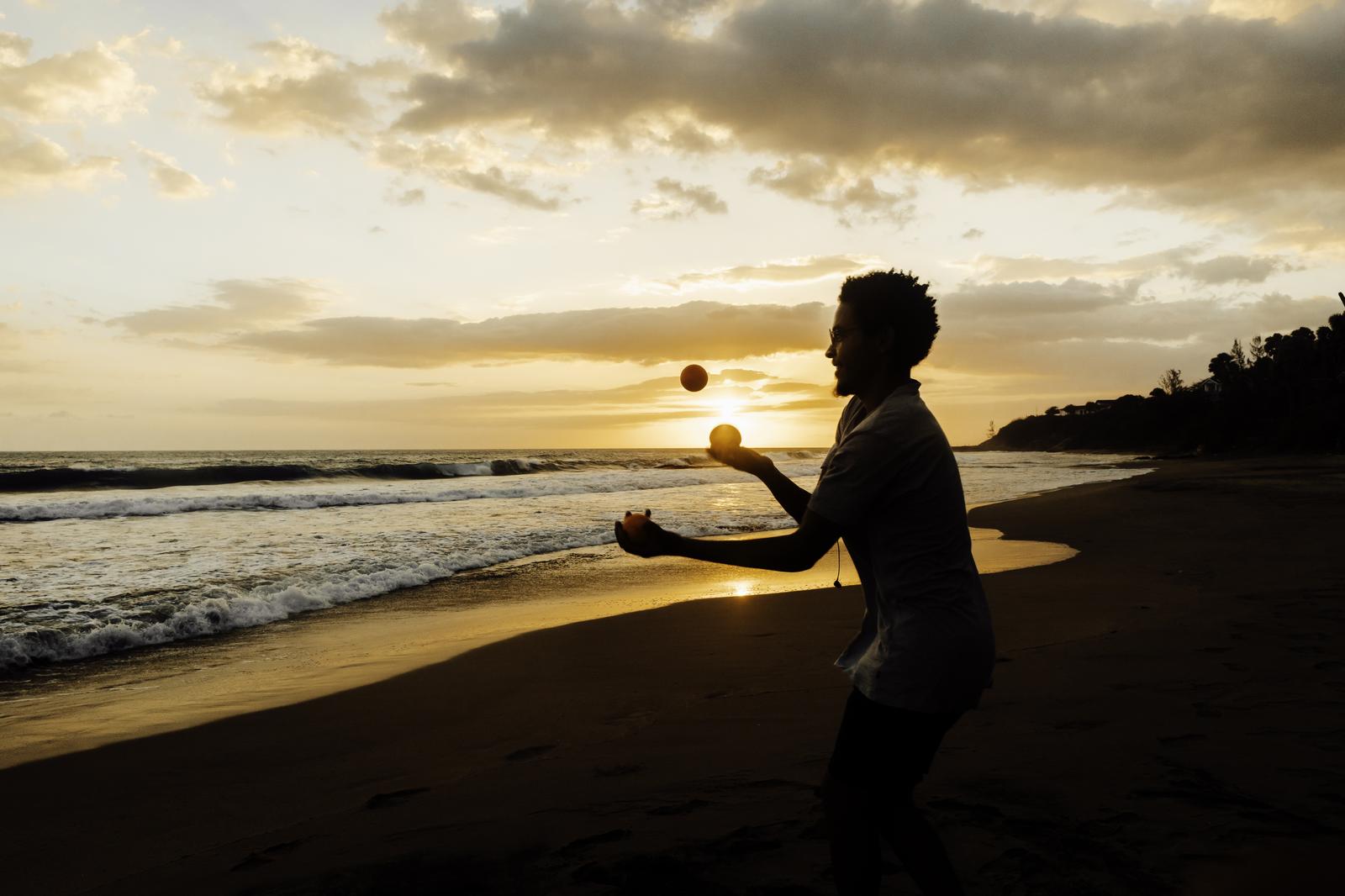
Changes? What changes?
I'm the one who initiates the changes
Adapt quickly and find a solution
Feel stressed but eventually adjust
Resist and prefer the original plan
How would you describe your approach to goal-setting?

I set clear, achievable goals
Goals stress me out
Goals? I prefer to go with the flow
I have goals, but they're flexible
I don't need goals, I'm already perfect
How do you handle conflicts in relationships?

I've never had a conflict
Conflicts? I'm a peacemaker!
Listen actively and find a compromise
Confront the issue head-on
Avoid confrontation at all costs
How often do you practice mindfulness?

Regularly, when I feel the need to relax
Occasionally, when I remember to do it
Daily, it's a crucial part of my routine
Mindfulness? What's that?
I am the embodiment of mindfulness
How do you handle compliments?

Downplay and deflect the compliment
Compliments? I hear them all the time!
Graciously accept and express gratitude
Compliments make me uncomfortable
I don't need compliments, I know I'm amazing
How do you handle failure?

Blame others for my failure
Feel discouraged but eventually move on
Learn from it and try again
Failure is just a stepping stone to success
Failure? I don't fail
How do you spend your free time?

I'm a professional napper
Free time? What's that?
Engage in hobbies and self-care
I'm always working, no time for breaks
Socialize with friends and family
How do you handle a mistake at work?

I never make mistakes
Stress about it for days
Mistake? That's a learning opportunity!
Blame others or external factors
Acknowledge it and work on a solution
Take a moment to celebrate, you've officially reached the halfway point! How do you approach new challenges?

Excitedly embrace them as opportunities
Avoid them at all costs
Challenges? I don't see any
Feel anxious but work through it methodically
I am the master of overcoming challenges
How would you describe your communication style?

I tend to overexplain
I communicate through interpretive dance
Clear and empathetic
Communication? I let my actions speak
I keep it brief and to the point
How do you handle success?

Downplay it and focus on the next goal
Success is my middle name
Celebrate and express gratitude
Success? I'm used to it
I don't seek success, I seek fulfillment
How do you handle uncertainty about the future?

Embrace it as an adventure
I have my entire life planned out
Feel anxious but take steps to plan
Uncertainty? I avoid thinking about it
I thrive in the unknown
How do you approach learning new things?

Methodically, breaking down complex concepts
I prefer to stick to what I already know
Enthusiastically with a love for knowledge
I learn through trial and error
Learning? I know everything already
How do you prioritize self-care?

It's a top priority, I make time for it daily
I practice self-care on special occasions
Self-care? I don't have time for that
What's self-care? I'm always carefree!
I prioritize it but sometimes forget
How do you handle multitasking?

I prefer to focus on one task at a time
Multitasking stresses me out
Efficiently, I thrive in multitasking situations
I am the master of all tasks simultaneously
Multitasking? I don't think I've tried that
The finish line is in sight! How do you handle a disagreement with a friend?

Avoid confrontation and hope it resolves itself
I'm always right, so disagreements are rare
Listen, communicate, and find a resolution
Disagreement? I don't remember having one
Confront the issue directly and express my feelings
You're almost done! How do you handle a setback in your personal life?

Setback? I only move forward
I turn setbacks into comebacks
Blame others for my setbacks
Reflect, learn, and work towards recovery
Seek support from friends and family
Last but not least, how do you approach personal growth and development?

Personal growth? I'm already perfect
Actively seek opportunities for growth
I prefer to stay as I am
I grow with each passing moment
Open to growth but take it one step at a time
Unlock Premium Features
This is a Premium feature. Subscribe now to access this and other great features!
Log in to Quizly
- Continue with Google
Personal Growth 120: Chapter 6 – Gaining Self-Awareness Practice Quiz

Unlock all answers in this set
Haven't found what you were looking for, search for samples, answers to your questions and flashcards.
- Enter your topic/question
- Receive an explanation
- Ask one question at a time
- Enter a specific assignment topic
- Aim at least 500 characters
- a topic sentence that states the main or controlling idea
- supporting sentences to explain and develop the point you’re making
- evidence from your reading or an example from the subject area that supports your point
- analysis of the implication/significance/impact of the evidence finished off with a critical conclusion you have drawn from the evidence.

- Research Guides
GUST 0305 | College Student Success | Guide to the OnCourse Text
- Chapter 9: Staying OnCourse to Your Success
- Chapter 1: Getting OnCourse to Your Success
- Chapter 2: Accepting Personal Responsibility
- Chapter 3: Discovering Self-Motivation
- Chapter 4: Mastering Self-Management
- Chapter 5: Employing Interdependence
- Chapter 6: Gaining Self-Awareness
- Chapter 7: Adopting Lifelong Learning
- Chapter 8: Developing Emotional Intelligence
- Career Projects
- Library Hours and Contact Info
- Stephan Montgomery
You will take this assessment twice: once at the beginning of the semester, and once again at the end of the term. Take your time, think about the question, and answer honestly. There are no wrong answers!
This is the success story of Stephan Montgomery. His story also appears on page 355 in your OnCourse textbook.
- << Previous: Chapter 8: Developing Emotional Intelligence
- Next: Career Projects >>
- Last Updated: May 10, 2024 1:00 PM
- URL: https://sjcd.libguides.com/GUST
https://www.sanjac.edu/library | Central Library: 281-476-1850 | Generation Park Campus: 281-998-6150 x8133 | North Library: 281-459-7116 | South Library: 281-998-6150 ext. 3306
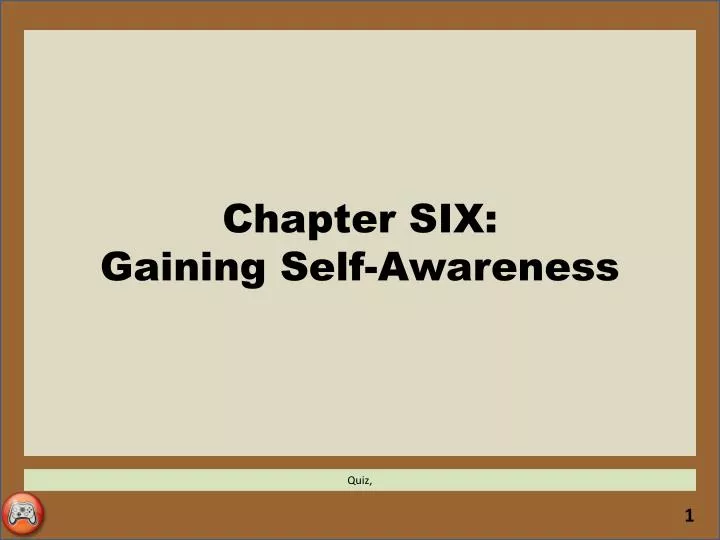
Chapter SIX: Gaining Self-Awareness
Apr 01, 2019
220 likes | 591 Views
Chapter SIX: Gaining Self-Awareness. Quiz, . Homework. Note: No late assignments will be accepted. Quiz Time. Reminder. 50% of your grade in this class College Strategies Presentation (50 pts.) Major and University Search (50 pts.) Individual Ed Plan Assignment (50 pts.)
Share Presentation
- group ed plan assignment
- cheating isn
- important assignment
- individual ed plan assignment
- invisible force
- 5th edition

Presentation Transcript
Chapter SIX:Gaining Self-Awareness Quiz,
Homework Note: No late assignments will be accepted.
Reminder 50% of your grade in this class • College Strategies Presentation (50 pts.) • Major and University Search (50 pts.) • Individual Ed Plan Assignment (50 pts.) • Group Ed Plan Assignment (50 pts) • TBA Presentation (50 pts.) • Personal Philosophy of Success Essay (50 pts.)
Gaining Self-Awareness
Case Study in Critical Thinking • Read Strange Choices (page 172) • Which student made the strangest choice?
Recognizing when you are off course • In which of your life roles are you aware of being off course? • Roles such as student, employee, brother, sister, parent, athlete, friend, etc. • Do you know how you got there? • Close your eyes, take a deep breath, relax, and consider your journey so far • “How well am I doing?” • “Am I reaching my goals?” If not, why?
Jerome’s Story • Freshman in college • Dream: Accounting Firm • Goal: earn 60k a year by 30th birthday • Long-term: Degree and pass CPA (certified public accountant) Exam • Short-term: A’s in every class • Created self-management system • Showed interdependence • Created study group • At end of semester, he fails Accounting 101…
Jerome failed Accounting 101…Why: • Skipped his accounting class 3 times to work a part-time job • Did not attend one class because he was angry at his girlfriend • Missed two classes because of the flu • Came late 5 times because of parking problems • Did not do his homework because he is busy • Did not hand in one important assignment because it was confusing • Stop going to study group after 1st meeting… he is not sure why • As the final exam came closer, he got a lot of anxiety and cram for the final exam. On day of exam, he blank on the exam.
Jerome’s story (cont.) • Was it his fault? • Was it possible for him to get back on course? “Invisible force comes along and bumps us off course”
Anatomy of a Script Habit Patterns • Habitual Thoughts: “If I don’t understand a subject right away, I never will.” • Habitual Emotions: “When I don’t understand a subject immediately, I get frustrated .” • Habitual Behaviors: “When I get frustrated, I quit.” Core Beliefs • “I’m not smart enough to succeed in college.”
Applying the Concept: Scripts Thought Emotion Emotion Behavior Behavior Emotion Thought • I’m so dumb • Being irritated • Being very angry • Driving around instead of stopping to ask directions • Often arriving late to class • Frustration • I’m no good in math Identify each statement as possible Thought, Emotion or Behavior
Applying the Concept: Scripts Core Beliefs • Cheating isn’t really a big deal • Not trying is better than failing • Asking for help is a sign of weakness • Effort is rewarded Behaviors • Studying math for 4 hours straight • Skipping a final exam for English class • Copying answers during a test • Avoiding the tutoring center What Core Beliefs (left) might lead to the Behavior (right)?
Calvin and Hobbes
Self-Awareness at Work • Career planning requires self-awareness • Identify your hard skills (special-knowledge skills that you’ve learned to do throughout your life from other people. E.g. abilities in sport, writing, computer programming, cooking, solving problems, etc.) • Identify your soft skills (ones you have developed to cope with life. E.g. seeing yourself as a Creator, developing relationships, being flexible, finding lessons in experiences, manage your emotions, feeling confidence, etc.
Self-Awareness at Work (cont.) • Identify your personal preference • Strong Interest Inventories • Self-Directed Search • Myers-Briggs Type Indicator • Holland Code
Why is this important? • It will help you identify which career is suitable for you • That’s why the Journal Entries are important. They assist you become self-aware of you behaviors, beliefs and attitudes. • Know this can help you excel in your workplace and in life
Homework • Journal 21 – page 182 • Journal 22 – page 185 • Journal 23 – page 194 • Read Wise Choices in College • Taking Tests – page 198 • Journals for 5th edition only: • 20, 21, 22
Study Guide • Unconscious forces • Victims and Creators • Scripts (chart) • The impact of outdated beliefs
- More by User
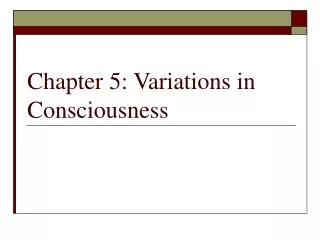
Chapter 5: Variations in Consciousness
Chapter 5: Variations in Consciousness The Nature of Consciousness What is consciousness? Your awareness of external events your awareness of internal sensations your awareness of yourself as a unique being having experiences your awareness of your thoughts about these experiences
1.79k views • 24 slides

Static Awareness Seminar
3. Static Awareness Seminar. Types of ESD Failures to Electronic Devices. Catastrophic Failure Device no longer operates Represents 10% of ESD failures Intermittent / Walking Wounded Device is operational, but erratic and will cause additional service calls
1.37k views • 51 slides
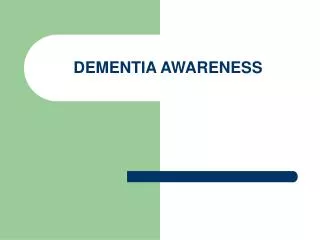
DEMENTIA AWARENESS
DEMENTIA AWARENESS. AIMS. To give carers a basic understanding of dementia. Learning Outcomes. Understand what is meant by the term dementia; the common causes; their signs and symptoms and related risk factors; and what is commonly mistaken for dementia
3.78k views • 36 slides
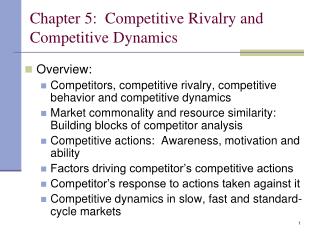
Chapter 5: Competitive Rivalry and Competitive Dynamics
Chapter 5: Competitive Rivalry and Competitive Dynamics. Overview: Competitors, competitive rivalry, competitive behavior and competitive dynamics Market commonality and resource similarity: Building blocks of competitor analysis Competitive actions: Awareness, motivation and ability
3.22k views • 18 slides
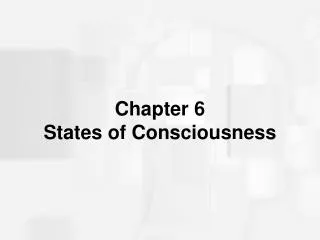
Chapter 6 States of Consciousness
Chapter 6 States of Consciousness. Some Early Definitions . Consciousness: All the sensations, perceptions, memories, and feelings you are aware of at any instant Waking consciousness: Normal, clear alert awareness
1.17k views • 94 slides

Methods of gaining space in the permanent dentition Types of clinical cases in Orthodontics: 1 Definite extraction cases
Methods of gaining space in the permanent dentitionCommon instances of space requirement 1) To relieve crowding / impacted teeth2) To correct proclination3) To level the curve of spee4) To intrude teeth. Methods of gaining space in the permanent dentitionCommon methods of gaining space 1) Se
2.63k views • 32 slides
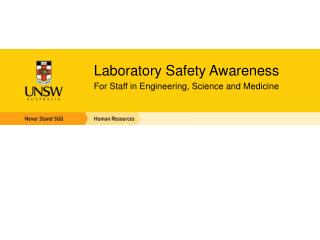
Laboratory Safety Awareness
Laboratory Safety Awareness. For Staff in Engineering, Science and Medicine. Course Outcomes. At the end of this course you will be able to: Participate in safe laboratory conduct Select and use appropriate personal protective equipment (PPE)
204 views • 0 slides
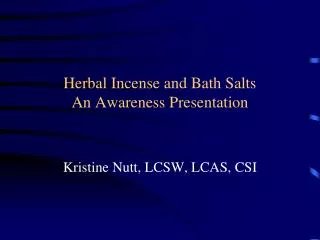
Herbal Incense and Bath Salts An Awareness Presentation
Herbal Incense and Bath Salts An Awareness Presentation. Kristine Nutt, LCSW, LCAS, CSI. Disclaimer. This presentation is meant to provide basic awareness information on herbal incense products and bath salts. There are hundreds of products being smoked for cannabis-like effects
1.27k views • 93 slides
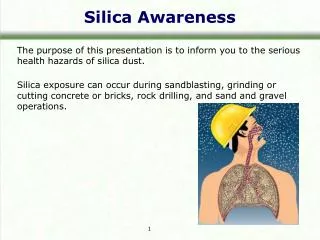
Silica Awareness
Silica Awareness. The purpose of this presentation is to inform you to the serious health hazards of silica dust. Silica exposure can occur during sandblasting, grinding or cutting concrete or bricks, rock drilling, and sand and gravel operations. 1. Industries with Silica Exposure.
2.27k views • 51 slides
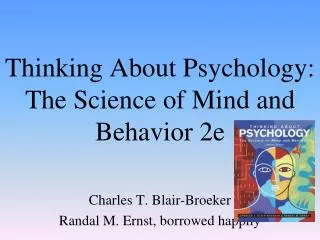
Thinking About Psychology: The Science of Mind and Behavior 2e
Thinking About Psychology: The Science of Mind and Behavior 2e. Charles T. Blair- Broeker Randal M. Ernst, borrowed happily. Consciousness Chapter. Sleep, Dreams, and Body Rhythms. Consciousness. Awareness of yourself and your environment. Consciousness: Personal Awareness .
1.09k views • 98 slides
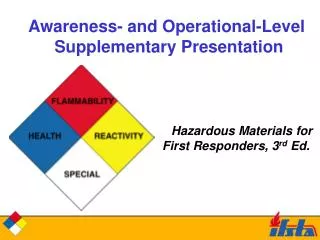
Awareness- and Operational-Level Supplementary Presentation
Awareness- and Operational-Level Supplementary Presentation. Hazardous Materials for First Responders, 3 rd Ed. Awareness Actions at Haz Mat Incidents. Consider wind direction and terrain. Implement the IMS. Use the ERG . Isolate and evacuate the area. Call for additional assistance.
1.1k views • 94 slides
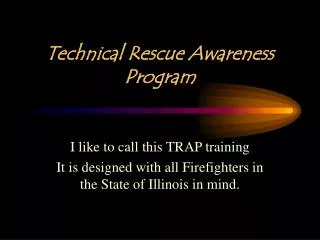
Technical Rescue Awareness Program
Technical Rescue Awareness Program. I like to call this TRAP training It is designed with all Firefighters in the State of Illinois in mind. Course Effective Date 01January 2001. This course will replace, Confined space / Trench Awareness 01/2002
2.78k views • 209 slides
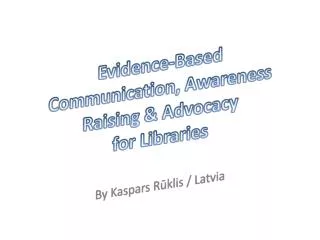
Evidence-Based Communication, Awareness Raising & Advocacy for Libraries
Evidence-Based Communication, Awareness Raising & Advocacy for Libraries. By Kaspars Rūklis / Latvia. Communication, Awareness Raising and Advocacy. Target Audiences vs Partnerships. Session Goals. Defining communication, awareness raising and advocacy for libraries
1.08k views • 89 slides

MOMENTUM? CHAPTER 7
I’d like some please. Momentum Store. MOMENTUM? CHAPTER 7. You might have heard people gaining momentum. What is it and how do you get it???. Sure Thing. MOMENTUM?. You might have heard people gaining momentum. What is it and how do you get it???. Here you go. Momentum Store.
1.2k views • 98 slides
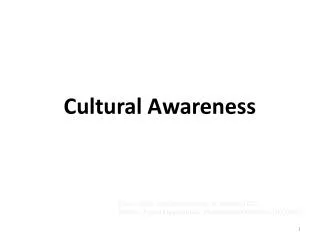
Cultural Awareness
Cultural Awareness. Curriculum and Instructional Standards Office Defense Equal Opportunity Management Institute (DEOMI). Objective. Understand how increased cultural awareness enables individuals to adapt effectively in cross-cultural environments in order to enhance mission effectiveness.
3.68k views • 31 slides
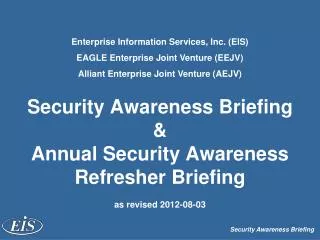
Security Awareness Briefing & Annual Security Awareness Refresher Briefing as revised 2012-08-03
Enterprise Information Services, Inc. (EIS) EAGLE Enterprise Joint Venture (EEJV) Alliant Enterprise Joint Venture (AEJV). Security Awareness Briefing & Annual Security Awareness Refresher Briefing as revised 2012-08-03. Executive Order 12958 as amended. The SF312 references Executive Order
1.6k views • 89 slides

University of Arizona Security Awareness Campaign
University of Arizona Security Awareness Campaign. Kelley Bogart University Information Security Coordinator. Gil Salazar Network Administrator University of Arizona. Agenda. Why Awareness Challenges Solutions Benefits Costs Initiatives Demonstration. Why Awareness?
1.38k views • 110 slides
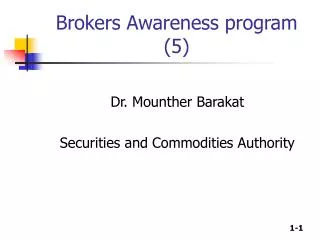
Brokers Awareness program (5)
Brokers Awareness program (5). Dr. Mounther Barakat Securities and Commodities Authority. برنامج توعية الوسطاء اللقاء الخامس. د. منذر بركات العمري هيئة الاوراق المالية والسلع. Margin Trading الاتجار بالهامش. Margin is the amount you put up to trade without paying the full balance.
1.62k views • 150 slides

2.46k views • 209 slides
Cultural Self-Awareness: A Comprehensive Guide to Its Roots
Cultural self-awareness is the conscious recognition of one's own cultural identity and influences. This self-awareness is a crucial component of cultural competence, allowing individuals to interact more effectively and empathetically with people from diverse backgrounds. It is a continuous journey of self-exploration and learning, which not only enhances personal growth but also strengthens professional and social interactions.
Sanju Pradeepa

Ever wonder where you came from and how your family history shaped who you are? Understanding your roots is key to developing cultural self-awareness. In this post, I’ll walk you through a step-by-step process to trace your ancestry and connect with your heritage. From researching your genealogy to exploring cultural traditions, you’ll gain meaningful perspective on your identity.
I’ll share tips for gathering family stories and traveling to ancestral homelands. You’ll also learn how to embrace and celebrate the one-of-a-kind mosaic that makes you who you are. So join me on a journey to discover your origins and gain newfound pride in the diverse threads of your tapestry. Let’s dive into your cultural background and unearth your unique sense of belonging
Table of Contents
What is cultural self-awareness.

Cultural self-awareness means understanding how your cultural background has shaped you. It involves reflecting on the beliefs, values, and assumptions you’ve developed as a result of your upbringing and environment.
Your Cultural Identity : Your cultural identity refers to the culture you most identify with based on factors like ethnicity, nationality, language, religion, and geography. The culture you’re born into has a significant impact on your values, behaviors, and way of thinking before you’re even aware of it.
The Influence of Culture : The culture you grew up in influenced you in both obvious and subtle ways. From an early age, you learned cultural norms, beliefs, and expectations from your family, community, and society. These teachings shaped your perceptions of the world and your place in it. They influence how you think, communicate, work, and interact with others.
Developing cultural self-awareness allows you to understand yourself better and appreciate the diversity in others. It helps reduce judgment and fosters openness, empathy, and inclusiveness. You can navigate cultural differences more effectively and avoid miscommunication or unintentionally offending someone from a different background than your own.
In summary, becoming culturally self-aware leads to greater understanding, sensitivity, and connection between people from all walks of life. And in today’s global world, that is a skill we could all benefit from developing.
Understanding Your Cultural Background
To truly understand yourself, you need to understand where you came from. Your cultural background encompasses a variety of factors like ethnicity, race, religion, and national origin. It shapes your beliefs, values, and behaviors in profound ways.
Your Ethnicity and Race : Your ethnicity refers to cultural factors like language, ancestry, and traditions. Your race refers to physical characteristics like skin color. Both have a significant impact on your cultural identity. Think about your family’s ethnic and racial background. How has it influenced the language you speak, the food you eat, and the holidays you celebrate? Understanding these connections can provide insight into yourself.
Your Religion or Belief System : For many, faith or spirituality is an integral part of their culture. Consider how your religious or belief system has shaped your values and worldview. What traditions or rituals do you practice? How has your faith community supported you? Reflecting on these questions can highlight how your beliefs permeate your cultural identity.
Your national origin—the country your family is from or the one you identify with culturally—also helps shape who you are. National origin influences cultural elements like dress, music, and pastimes. Think about the national values and symbols that you identify with. How do they make you feel connected to that cultural community? Exploring your national origin provides another lens into your cultural roots.
Gaining insight into your cultural background takes reflection and patience. But by understanding the ethnic, religious, and national influences in your life, you can gain a deeper understanding of yourself—where you came from and where you’re going. Identity is a journey, so start by looking within.

What are Cultural Beliefs: An Introduction to Belief Systems
Recognizing your own cultural biases and prejudices.
A key step to developing cultural self-awareness is acknowledging your own biases and prejudices. We all have them; it’s part of being human. The beliefs and stereotypes you grew up with can shape your views in subtle ways you may not even realize.
Take some time to reflect on your cultural assumptions and tendencies. Do you make snap judgments about people from certain ethnic or socioeconomic backgrounds? Do you believe some cultures are inherently superior to others? These prejudices often form early and can be hard to recognize in yourself. But facing them head-on is the only way to overcome them.
As you examine your biases, think about their roots. Were they messages you received from family, friends, media, or society at large? Understanding their origin can help you see why those views took hold and why they’re flawed. Also, consider how your biases influence your daily thoughts and interactions. Do they impact how you treat or think about people from other cultures? Acknowledging specific examples will make the changes you need to make more clear.
Overcoming cultural biases is a lifelong process. But the first step is to develop an awareness of them through honest self-reflection. As you notice prejudices arise, make an effort to challenge them with an open and empathetic mindset. Seek to understand other cultures on their own terms, not just in comparison to your own. And remember, everyone is equally human; our cultural differences are only surface-level. With continuous work, you can overcome harmful biases and become more culturally sensitive. But it starts by recognizing them in yourself.

What are Cultural Values? A Comprehensive Guide for All
Becoming open to different cultures.

To become open to different cultures, you first need to recognize that every culture has value. Rather than judging other cultures based on your own cultural norms, try approaching them with an open and curious mindset.
Ask yourself questions about other cultures to gain understanding. For example, consider why certain traditions or beliefs may have developed or how they help shape cultural identities. Recognize that there are many ways for human societies to thrive and that cultural diversity makes humanity richer as a whole.
Make an effort to expose yourself to cultural influences beyond your own. Read books, watch movies, listen to music, cook meals, or travel to places that highlight different cultural traditions. Even following social media influencers from diverse backgrounds can help expand your perspective. The more you expose yourself , the more normal and relatable other cultures will feel.
Look for opportunities to connect with people from different cultures. Strike up a conversation with a neighbor or coworker and ask them questions about their cultural background and experiences. Look for local cultural groups or events in your area and attend with an open mind. Traveling to other countries is also a great way to gain firsthand experience with different cultures, if you’re able to. Rather than making assumptions, ask respectful questions. Be willing to listen without judgment as people share details about cultural beliefs or experiences that differ from your own. Look for common ground and shared values that transcend cultural differences. Treat people the way you would want to be treated.
Becoming open to different cultures requires continuous effort and practice. But by nurturing your curiosity about diversity and seeking to understand rather than judge others, you’ll find yourself embracing cultural differences more easily over time. And you’ll discover that there is more that unites us as humans than divides us.

The Importance of Cultural Values in the 21st Century
Developing cross-cultural communication skills.

To communicate effectively across cultures, you need to increase your self-awareness and understanding of cultural differences. Consider how your own cultural values and experiences shape your perspectives and interactions. What are your assumptions and biases? How do they influence the way you interpret behaviors and communicate with others? Asking these types of reflective questions can help you become more open-minded and culturally sensitive.
Learn About Other Cultures
Do some research on the cultural backgrounds of those you interact with regularly. Study cultural values, communication styles, and business practices. Look for both similarities and differences compared to your own culture. This knowledge will help you interpret interactions appropriately and avoid misunderstandings.
Observe Cultural Differences
Pay close attention to how people from different cultures communicate in various situations. Notice things like eye contact, gestures, greetings, decision-making styles, and approaches to conflict. Try to understand the reasons behind these cultural differences instead of judging them as “strange” or “inappropriate.” With an open and curious mindset, you can learn a great deal through direct observation.
Adapt Your Communication Style
Once you have a better understanding of a culture, adapt your communication style to be more effective. Make eye contact, use gestures, greet people, and express yourself in ways that are culturally appropriate and help to build rapport. Adjust your tone, pace, and word choice to suit different cultural contexts. The ability to adapt in these ways is a hallmark of skilled cross-cultural communicators.
Ask Questions and Share Information
Don’t be afraid to ask polite questions about cultural norms and styles. People will usually appreciate your interest in learning about their culture. Also, share information about your own cultural background to build mutual understanding. Engage in genuine dialogue and exchange, not just one-way questioning.
Building cross-cultural communication skills takes conscious effort and practice. But by increasing your cultural self-awareness and focusing on understanding others, you can overcome barriers to making meaningful connections across all types of cultural differences.
Tips for Interacting With People From Different Cultures

To interact respectfully with those from different cultural backgrounds, start by acknowledging your own cultural roots and how they shape you. Recognize that your defaults aren’t universal. The way you communicate, your values and habits , and your assumptions about etiquette are learned from your own culture. Don’t assume others share them.
Next, do some research on the cultural norms of the groups you’ll interact with. Learn about communication styles, values, taboos, and etiquette. For instance, some cultures value indirect communication and politeness over efficiency . Others prioritize hospitality and community over independence. Understanding these differences will help you avoid offending others or causing discomfort.
When interacting, focus on listening and observation. Pay attention to the other person’s style of communication and follow their lead. Also, observe how people interact with each other. Look for cues in appropriate greetings, posture, eye contact, and conversation topics. Don’t be afraid to politely ask questions about cultural norms. Most people will appreciate your interest in learning.
Show interest in learning more about the other culture. Ask open-ended questions about traditions, values, and experiences that shape their cultural perspective. Share information about your own background too to build mutual understanding. Look for opportunities to collaborate and participate in meaningful exchanges.
Make an effort to learn some greetings, phrases, or customs of the other culture. Even a small attempt goes a long way in demonstrating your respect. Pronounce names and terms properly. Be aware of appropriate gestures and body language. Follow the lead of your hosts or colleagues on things like seating arrangements, toasts, or dress. Accept that you may feel uncomfortable at times, but facing that discomfort builds character and cultural competence.
With an open and curious mindset, you can build connection across cultural differences. Focus on listening, learning, and finding common ground. Your interactions may feel awkward or imperfect, but pushing past discomfort is how we grow. With time and effort, interacting with cultural diversity can become natural and rewarding.
Continuously Educating Yourself About Other Cultures

As cultures and values evolve over time, it’s important to make continuous learning a habit. Learn about the cultures that surround you, as well as those that seem very different. Start by reading books, blogs, or articles on cultural topics that interest you. Follow accounts on social media that share information about different cultural groups. Watch documentaries on cultural traditions, values, and histories that are unfamiliar to you.
Seek out opportunities to expose yourself to cultural experiences outside your norm. Visit museums, places of worship, cultural centers, and events in your area. Experience cultural traditions like food, music, dance, and festivals. Some events may allow you to participate, while others may be more observational. Either way, immerse yourself in the experience.
Traveling to other countries and regions is also tremendously valuable, if you are able to do so. Nothing is more valuable than immersing yourself in another culture firsthand. But if international travel isn’t possible, explore cultural neighborhoods in your own city or state. Try new restaurants with cuisines you’ve never tasted. Shop at stores that cater to different cultural groups. Strike up friendly conversations with people from diverse backgrounds.
Continuously learning about cultures beyond your own leads to greater understanding, empathy, and connection between people. Make it a lifelong practice to open your mind to new cultural insights and experiences whenever possible. Our shared humanity becomes more apparent the more we understand each other. And the more you understand other cultures, the more you may gain valuable perspective on your own.
Stepping Outside Your Cultural Comfort Zone
You may feel most at ease surrounded by familiar cultural norms, values and behaviors. However, limiting yourself to what is comfortable and familiar can narrow your perspective and prevent growth. Stepping outside your cultural comfort zone from time to time is important for developing cultural self-awareness and building empathy.
Try exposing yourself to different cultural activities and events in your local community. Attend a religious service for a faith other than your own or visit an ethnic cultural center or museum. Make an effort to understand different cultural traditions by reading about them or even participating if you’re invited to do so. Engaging in intercultural dialogue and asking open-minded questions is key. Traveling to
Don’t underestimate the value of smaller steps. Strike up a genuine conversation with someone from a different ethnic background. Ask them questions about their cultural values and experiences, and listen without judgment.
Challenging stereotypes and prejudices you may hold-even unconsciously-is essential work. Notice when you make assumptions about others and question why you view them that way. Seek out opinions and stories that counter commonly held stereotypes. Follow public figures from a variety of cultural backgrounds to expand your perspective.
Pushing beyond the familiar may feel awkward and uncomfortable initially. That discomfort usually comes from confronting biases and realizing the narrowness of your previous views. Lean into that discomfort; it means you’re learning and growing in meaningful ways. With an open and willing attitude, you can gain valuable insight into yourself and others. Stepping out of your comfort zone and embracing cultural differences will enrich you in ways you never imagined.

Life Begins at the End of Your Comfort Zone: Embrace Change
Seeing the world from different cultural perspectives.
To develop a strong sense of cultural self-awareness, it’s important to understand how different cultures view and interact with the world. Your cultural lens shapes how you interpret everything around you, but other cultures have their own unique lenses. Exposing yourself to diverse perspectives can help broaden your mindset and gain valuable insight into yourself and others.
Try putting aside your cultural assumptions and seeing through the eyes of different groups. For example, individualistic cultures like the U.S. and Canada emphasize personal achievement, while collectivist cultures like China and Japan focus on community and group harmony. If you’re from an individualistic culture, imagine what it’s like to value group needs over your own. How might that shape your choices and behaviors?
Religions also represent distinct worldviews. As a Christian, try to understand Islamic or Hindu beliefs from an insider’s perspective. What spiritual truths or life principles do they hold that you can appreciate? Similarly, learn about cultures that differ from your own in terms of economic or social ideology. A capitalist viewpoint will differ greatly from a communist one, just as a culture that values strict social hierarchies will contrast with one that emphasizes equality.
Dig into cultural art forms, myths, and stories, which often reveal what a group finds meaningful or sacred. Anthropological resources on cultural traditions, rites of passage, and daily life can teach you a lot about what people in that culture prioritize and how they see themselves in relation to others. Travel, if you’re able, and immerse yourself in cultures different from your own. Nothing educates you like direct experience.
Recognizing that your culture is one of many worldviews, not the “right” or only way of thinking, leads to openness, empathy, and compassion. And by embracing diverse cultural perspectives, you gain a richer understanding of yourself and what has shaped you. This kind of self-knowledge and intercultural understanding is so important in our increasingly global and pluralistic society. Expand your mind-see the world through different eyes.
Seeking Out Diverse Perspectives and Experiences
Immersing yourself in diverse perspectives and experiences is vital for developing cultural self-awareness. The more you expose yourself to cultures different from your own, the more you’ll understand cultural values and norms—and your own cultural biases .
Seek out media from different cultural viewpoints, like podcasts, YouTube channels, books, movies, TV shows, and music. Follow influencers from a variety of backgrounds on social media. Travel to experience different cultures firsthand when possible. Even exploring diverse neighborhoods in your own city can provide valuable exposure.
Engage in meaningful conversations with people from different walks of life. Ask open-ended questions about their experiences and perspectives. Listen without judgment and reflect on your reactions. Look for opportunities to work with diverse colleagues. Mentor or volunteer to help underserved groups in your community.
Consider a study abroad program or cultural exchange. Living in another culture, even for a short time, is a profoundly eye-opening experience. You’ll gain a deeper appreciation for that culture’s values and daily life. You may also view your own culture through a new lens.
Reflect regularly on your experiences and interactions. How did they challenge your assumptions or stereotypes ? What did you learn about that culture’s values and way of life? How did they make you feel, and why did you have that reaction? Journaling about these reflections can lead to powerful insights.
While becoming culturally self-aware is a lifelong process, seeking out diverse perspectives and experiences is how you’ll make progress. Approach each new encounter with an open and curious mind. Look for the humanity you share with others, not the differences that separate you. Your understanding and empathy will grow with each interaction.
Cultural self-awareness is understanding your own cultural identity, beliefs, biases, and behaviors. Developing this awareness takes time and reflection. Here are some common questions about the cultural self-awareness journey:
Where do I start? Begin by reflecting on your cultural background and upbringing. Think about your family’s values and traditions. Consider how your cultural identity has shaped your perspectives and behaviors. Discuss these reflections with others who share your cultural background. Their insights can help deepen your understanding.
What cultures have influenced me? The cultures that shape you extend beyond your ethnic heritage. Consider the regional culture you grew up in, your family’s socioeconomic status, your religion or spirituality, and other groups you belong to. All of these cultures combine to form your cultural identity.
What are my biases? We all have implicit biases based on our cultural conditioning. Notice when you have strong negative or positive reactions to people from certain groups. Ask yourself what assumptions or stereotypes might be influencing those reactions. Look for patterns in your thinking that could lead to prejudiced behavior. Awareness of your biases is the first step to overcoming them.
How does my culture affect my interactions with others? Your cultural background influences how you communicate, perceive social cues, and interpret behaviors. Cultural norms shape concepts like personal space, eye contact, and emotional expression. Understanding these differences can help you connect across cultures by adapting your style and avoiding miscommunications.
Becoming culturally self-aware takes continuous work. Make it a habit to reflect regularly on how your cultural identity impacts your thoughts and actions. Discuss your insights with others, and listen with an open mind to different cultural perspectives. This lifelong learning process will lead to a greater understanding of yourself and others.
- Developing knowledge and understanding of diverse perspectives, global awareness, or other cultures Author: David Pollock, IDEA
- Developing cross-cultural communication skills. Authors: Jenni Gilleard and John D. Gilleard , Publication: Journal of Professional Issues in Engineering Education and Practice, Volume 128, Issue 4, https://doi.org/10.1061/(ASCE)1052-3928(2002)128:4(187)
- Cultural bias and practices may influence what the person believes happened . From: Child Abuse Investigation Field Guide, 2015
- C ultural Self-Awareness as Awareness of Culture’s Influence on the Self: Implications for Cultural Identification and Well-Being by Chieh Lu , Ching Wan PMID: 29359626 DOI: 10.1177/0146167217752117

Let’s boost your self-growth with Believe in Mind.
Interested in self-reflection tips, learning hacks, and knowing ways to calm down your mind? We offer you the best content which you have been looking for.
Follow Me on
You May Like Also
Leave a Comment Cancel reply
Save my name, email, and website in this browser for the next time I comment.

IMAGES
VIDEO
COMMENTS
Self-sabotage. behavior that creates problems and interferes with longstanding goals. One of the most important discoveries in pyschology. is the existence and power of unconscious forces in our lives. Dr. Wilder Penfield of the Montreal Neurological Institute. found evidence that our brains may retain nearly every experience we have ever had ...
Closest to the surface of our awareness reside the directions for how we are to think, feel, and behave. Include habitual self talk such as I'm too busy, I'm good at math, people different from me are a threat, I always screw up. Include habitual feelings such as anger, excitement, anxiety, sadness, and joy.
Chapter 6 Gaining Self Awareness. Get a hint. Leverrier predicted that an invisible planet was pulling the planet Uranus off its predicted course around the sun. Likewise, human beings are pulled off course by the invisible forces of their ___. a. conscious. b. unconscious.
Chapter 6: Gaining Self-Awareness. 1) Be able to recognize if you are off course and 2) steps to return to your plan. Click the card to flip 👆. 1) you aren't achieving your desired outcomes and experiences. 2) >begin by accepting personal responsibility. >chose personally motivating goals and dreams. >create self-management plan. Click the ...
Chapter 6: Gaining Self-Awareness. 1. Multiple Choice. 1. Leverrier predicted that an invisible planet was pulling the planet Uranus off its predicted course around the sun. Likewise, human beings are pulled off course by the invisible forces of their _____. 2. Multiple Choice. Many people sabotage their goals and dreams by unconsciously ...
Study Skills Chapter 6 Gaining Self-Awareness. Get a hint. self-sabotage. Click the card to flip 👆. ruining your task, setting yourself off course. Click the card to flip 👆. 1 / 16.
4 Ways to Increase Self-Awareness. A thought diary is a foundational place to begin increasing self-awareness. Keep track of thoughts that pop up in the form of an automatic reaction. Track what was occurring at the time. Track your level of emotion to the stimulus.
There are many techniques you can practice to develop self-awareness. Some common techniques include: Mindfulness Meditation. Grounding techniques, and reconnecting to the Earth. Tai Chi, Qigong, or Yoga. Strength Assessments, such as the Values in Action Strength Test, from the University of Pennsylvania. Journaling.
Self-awareness is your ability to perceive and understand the things that make you who you are as an individual, including your personality, actions, values, beliefs, emotions, and thoughts. Essentially, it is a psychological state in which the self becomes the focus of attention . While self-awareness is central to your identity, it is not ...
Unlock your full potential by understanding the components of self and gaining self knowledge. Take this quiz to learn how self-awareness can help you control emotions, reach your goals, make better decisions, and improve relationships. Discover the power of self-discovery and personal growth.
Chapter 6: Gaining Self-Awareness; Chapter 7: Adopting Lifelong Learning; Chapter 8: Developing Emotional Intelligence; Chapter 9: Staying OnCourse to Your Success; Career Projects; Library Hours and Contact Info; Websites; Annette Valle; These handouts from various universities provide excellent tips for taking different kinds of tests. Keep ...
Self-Awareness Test: Why Self-Awareness Matters. Self-awareness goes beyond mere introspection; it's a dynamic process of recognizing and understanding our thoughts, emotions, and behaviors. This cognitive skill empowers us to make informed decisions, build stronger relationships, and navigate life's twists and turns with resilience.
Chapter 6 : Gaining Self-Awareness by alexis royal on Prezi. Blog. April 18, 2024. Use Prezi Video for Zoom for more engaging meetings. April 16, 2024. Understanding 30-60-90 sales plans and incorporating them into a presentation. April 13, 2024.
Personal Growth 120: Chapter 6 - Gaining Self-Awareness Practice Quiz 🎓 Get access to high-quality and unique 50 000 college essay examples and more than 100 000 flashcards and test answers from around the world! ... Enter a specific assignment topic; Aim at least 500 characters; Get explanation. Question. What is the right structure for an ...
Building Self-Awareness. My Feelings and Thoughts. While examining my peer's written assignment, there are some thoughts and feelings I had. I was hoping that the essay was not too long but according to the requirements, i., 2 pages. I was also hoping to get the major points stated clearly not struggling to understand or find them.
Self awareness - the ability to recognise your emotions and appreciate your own strengths and weaknesses - is the foundation of emotional intelligence and is the key to being an effective manager ...
Chapter 3: Discovering Self-Motivation; Chapter 4: Mastering Self-Management; Chapter 5: Employing Interdependence; Chapter 6: Gaining Self-Awareness; Chapter 7: Adopting Lifelong Learning; Chapter 8: Developing Emotional Intelligence; Chapter 9: Staying OnCourse to Your Success; Career Projects; Library Hours and Contact Info
Self Awareness. Module 4 • 5 hours to complete. An introduction to self-assessment tools that allow you to identify strengths and weaknesses and how they could impact your leadership style. This week's tool for your leadership toolkit is developing your statement of life purpose. What's included.
Chapter SIX:Gaining Self-Awareness Quiz, Homework Note: No late assignments will be accepted. Quiz Time. Reminder 50% of your grade in this class • College Strategies Presentation (50 pts.) • Major and University Search (50 pts.) • Individual Ed Plan Assignment (50 pts.) • Group Ed Plan Assignment (50 pts) • TBA Presentation (50 pts.)
Cultural self-awareness is the conscious recognition of one's own cultural identity and influences. This self-awareness is a crucial component of cultural competence, allowing individuals to interact more effectively and empathetically with people from diverse backgrounds. It is a continuous journey of self-exploration and learning, which not ...
Pre-Test: Post-Test: 68 68 Accepting personal responsibility 79 80 Discovering self-motivation 77 76. AI Homework Help. Expert Help. Study Resources. Log in Join. M08 Assignment Self Assessment Post-test.docx - Pre-Test:... Doc Preview. Pages 2. Maseno University. HOMEWORK H. HOMEWORK H 103. HighnessMusicGuineaPig14. 3/10/2024. View full document.